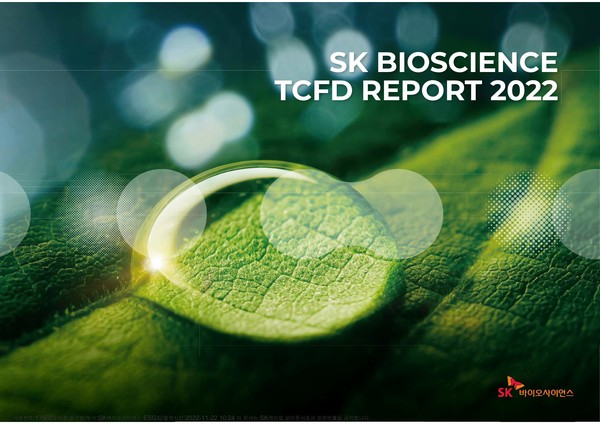SK Bioscience said on Tuesday that it has published the first Task Force on Climate-related Financial Disclosures (TCFD) report containing business sustainability and response strategies to fight climate change, following its ESG report in June.

TCFD is an international consultative body established by the Bank for International Settlements (BIS) Financial Stability Board (FSB) at the request of the G20 in 2015.
A TCFD report helps internal and external stakeholders make transparent decisions. It also encourages a company to identify risks and opportunities from climate change, establish strategies, and disclose the expected financial impact.
In the TCFD report, SK Bioscience specified its governance structure, strategy, risk management, indicators, greenhouse gas reduction strategy and financial impact to cope with climate change.
The report identified major risks climate change could bring about -- strengthening policy for carbon pricing, growing need for self-sufficiency of vaccines and post-pandemic bio-security, rising demand from stakeholders to strengthen climate change responses and increasing costs, and the transmission and spread of mediated infectious diseases due to insect and rodent habitat changes and abnormal weather phenomena.
On the other hand, the report said main opportunities coming from climate change could be -- increased sustainability of global joint projects by mandatory disclosure of response status, a strengthened position of vaccine operators through leading responses, environmental protection by actively responding to climate change, and contributions to the prevention and spread of zoonotic diseases.
Accordingly, SK Bioscience has established the 2024 RE100 and 2031 Net Zero strategies to respond to climate change and reduce the average temperature of the Earth from the perspective of global health issues. The goal is to achieve zero carbon emissions in 2031 by reducing carbon emissions through 100 percent conversion to renewable energy by 2024 and converting fuel used in factories into eco-friendly energy.
SK Bioscience said it established a climate change response governance centered on the board of directors and an ESG committee to oversee mid to long-term climate change management strategies.
Additionally, for organic cooperation between organizations, a working-level consultative body was formed under the ESG committee to establish an integrated risk management system for climate change.
SK Bioscience said it will disclose relevant information in stages to reveal the implementation results, in line with TCFD recommendations.

